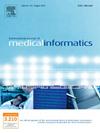抗菌药耐药性的新方法:重症监护病房耐碳青霉烯类克雷伯氏菌的机器学习预测。
IF 3.7
2区 医学
Q2 COMPUTER SCIENCE, INFORMATION SYSTEMS
International Journal of Medical Informatics
Pub Date : 2024-12-07
DOI:10.1016/j.ijmedinf.2024.105751
引用次数: 0
摘要
这项研究是在土耳其Kocaeli大学医院进行的,旨在使用极端梯度增强(XGBoost)算法(一种人工智能形式)预测重症监护病房中碳青霉烯耐药性肺炎克雷伯菌感染。这是一项涉及289例患者的回顾性病例对照研究,其中包括159例碳青霉烯耐药个体和130例碳青霉烯敏感个体作为对照。该模型的预测分析结合了多种人口统计学、临床和实验室数据,平均准确率为83.0%,精密度为83%,灵敏度为88%,F1评分为85%,马修斯相关系数为0.66。延长住院时间和重症监护病房住院时间是耐碳青霉烯肺炎克雷伯菌感染的重要预测因素。人工智能在医疗保健中的作用,特别是在管理抗生素耐药感染的icu中的作用,是医学的一项重大发展。这项研究强调了人工智能在预测抗菌素耐药性和改善资源有限环境下的临床决策方面的潜力。该研究已获ClinicalTrials.gov批准(试验注册号NCT05985057,于2023年8月2日批准)。本文章由计算机程序翻译,如有差异,请以英文原文为准。
A novel approach to antimicrobial resistance: Machine learning predictions for carbapenem-resistant Klebsiella in intensive care units
This study was conducted at Kocaeli University Hospital in Turkey and aimed to predict carbapenem-resistant Klebsiella pneumoniae infection in intensive care units using the Extreme Gradient Boosting (XGBoost) algorithm, a form of artificial intelligence. This was a retrospective case-control study involving 289 patients, including 159 carbapenem-resistant and 130 carbapenem-susceptible individuals as controls. The model’s predictive analysis combined a diverse range of demographic, clinical, and laboratory data, resulting in an average accuracy of 83.0%, precision of 83%, sensitivity of 88%, F1 score of 85%, and Matthews Correlation Coefficient of 0.66. Prolonged hospitalization and intensive care unit stay were significant predictors of carbapenem-resistant Klebsiella pneumoniae infection. The role of artificial intelligence role in healthcare, particularly in ICUs for managing antibiotic-resistant infections, is a major development in medicine. This study emphasizes the potential of artificial intelligence to predict antimicrobial resistance and improve clinical decisions in resource-limited settings. The study was approved by ClinicalTrials.gov (trial registration number NCT05985057 on 02.08.2023).
求助全文
通过发布文献求助,成功后即可免费获取论文全文。
去求助
来源期刊

International Journal of Medical Informatics
医学-计算机:信息系统
CiteScore
8.90
自引率
4.10%
发文量
217
审稿时长
42 days
期刊介绍:
International Journal of Medical Informatics provides an international medium for dissemination of original results and interpretative reviews concerning the field of medical informatics. The Journal emphasizes the evaluation of systems in healthcare settings.
The scope of journal covers:
Information systems, including national or international registration systems, hospital information systems, departmental and/or physician''s office systems, document handling systems, electronic medical record systems, standardization, systems integration etc.;
Computer-aided medical decision support systems using heuristic, algorithmic and/or statistical methods as exemplified in decision theory, protocol development, artificial intelligence, etc.
Educational computer based programs pertaining to medical informatics or medicine in general;
Organizational, economic, social, clinical impact, ethical and cost-benefit aspects of IT applications in health care.
 求助内容:
求助内容: 应助结果提醒方式:
应助结果提醒方式:


